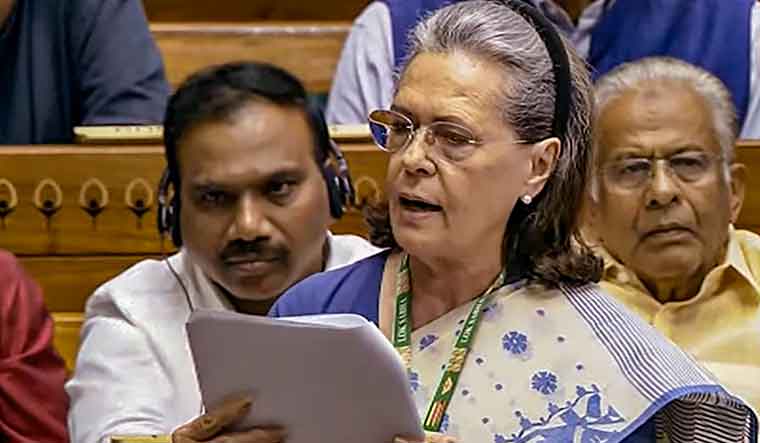Congress chairperson Sonia Gandhi, as she led her party in the debate on the women's reservation bill in the Lok Sabha on Wednesday, demanded from the government that it must be ensured that the 33 per cent quota for women in the legislative bodies includes reservation for those belonging to the Scheduled Castes, Scheduled Tribes and Other Backward Castes.
“The Indian National Congress demands that the bill must be implemented immediately. But a caste census must be conducted and reservation must be provided to women belonging to Scheduled Castes, Scheduled Tribes, OBCs. The government must undertake whatever steps are required to make this possible,” Gandhi said.
Gandhi's comments mark a change in the Congress's stance on the Women's Reservation Bill, since it had not taken up the bill, passed in the Rajya Sabha in 2010 during the Manmohan Singh regime, in the Lok Sabha because of demands from parties like the Samajwadi Party and the Rashtriya Janata Dal that there must be quota within quota for women belonging to the backward castes. The change in the stance is, however, in tune with the demand of the Congress and its INDIA alliance partners for a caste census to be conducted.
The demand that the reservation for women in the Lok Sabha and the Vidhan Sabhas must include a sub-quota for women from the OBCs has accompanied the proposed legislation right from 1996 when it was first brought to Parliament.
A joint parliamentary committee chaired by Geeta Mukherjee had studied the 1996 bill and made some recommendations, one of which was to have a sub-quota for women belonging to OBCs after the Constitution provided for reservation for OBCs.
The bill introduced by the UPA government in the Rajya Sabha in 2008 was studied by a parliamentary standing committee headed by Jayanthi Natarajan. This committee noted in its report that the question of reservation within reservation for OBC women and some minorities generated great discussion in the panel. It said that one section of opinion was strongly of the view that such OBC reservation within reservation should be provided.
“The Committee is of the view, that this matter should be considered by Government and action on this taken at the appropriate time,” the panel said.
In its written submission to the committee, the RJD had said there must a quota for OBC, minorities, including Muslims, Christians and others, and dalits within the 33 per cent reservation for women. “There must be quota within quota for these sections of women proportionate to their population in the country,” it said.
The SP had said in its written submission to the panel that “...if reservation is to be given to women, there must be a quota for OBC and Muslim women within it.”
The BJP, on the other hand, had said in a written memorandum to the committee that “...Bharatiya Janata Party supports the proposed Women's Reservation Bill. We firmly reject the demand of Quota within Quota.”
In its written submission, the Congress had stated: “The Congress party supports the Bill as it has been introduced in the Rajya Sabha.”
But is also said that it was willing to go with the consensus that may evolve among the various political parties represented in the Standing Committee regarding certain other aspects, in order to facilitate early passage of the bill.



